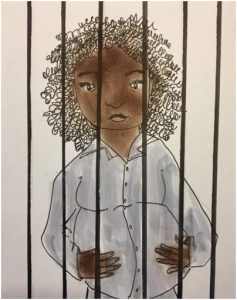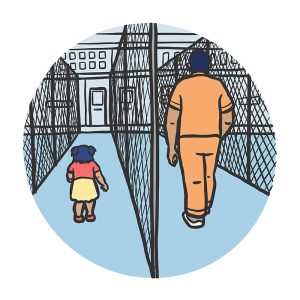Children of incarcerated parents

Policing and imprisonment regularly harm children and youth directly and indirectly. Children and youth are particularly vulnerable when they enter the justice system, but are also collateral victims when their parents are arrested or imprisoned. See this short true story to have a sense of the stigma and trauma experienced when a parent is incarcerated:
Children are often ignored in the process of a parent’s arrest, remand, sentencing, and imprisonment, yet they experience a range of psychological, social, and economic hardships.
Many challenges are faced by children who are born into or living in prison with a parent, as well as children who are left on the outside. Read an article we wrote about the experiences of children when a parent goes to prison.
Working together to expand our impact
CFSC played a major role in founding the Canadian Coalition for Children with Incarcerated Parents. The Coalition is made up of both organizations and individuals. It seeks systemic changes to make the best interests of the child a primary consideration in all decisions and at every stage of the justice system in Canada. The CCCIP also supports the empowerment and education of children and their families. It helps children and families to advocate for themselves.

Untitled Illustration by Rachel Derrah, Published in the Understorey Magazine Issue 8: Women and Justice. Understorey Magazine received a CFSC community grant to assist publication of this special issue.
In 2018 CFSC commissioned a report called Considering the Best Interests of the Child when Sentencing Parents in Canada: Sample Case Law Review (PDF). It summarises literature and research on children of incarcerated parents in Canada, international standards and norms, and presents our research on sentencing practices.
The findings were clear: in Canada, hundreds of thousands of children are affected when their parents are imprisoned, yet there is no consistent or clear standard for ensuring their wellbeing.
In 2019 CFSC hosted a first of its kind dialogue, bringing together over 35 organizations and individuals to discuss children of incarcerated parents in Canada. The Dialogue led to the report Breaking the Silence: Dialogue on Children of Incarcerated Parents (PDF), which provides an overview of presentations, policy discussions, and recommendations about Canada’s role and responsibility to children of incarcerated parents. One outcome of this Dialogue was the creation of the Coalition.
Now, on our own and in partnership, we continue working to promote international standards and practices that uphold the best interests of the child. (These include The Convention on the Rights of the Child, the UN Rules for the Treatment of Women Prisoners and Non-custodial Measures for Women Offenders (Bangkok Rules), and the Standard Minimum Rules for the Treatment of Prisoners (1955) and revised Mandela Rules.) See for instance our 2020 Submission to the United Nations Regarding Children of Incarcerated Parents in Canada.
Another significant set of issues arises when women are pregnant in prison or have babies at the time of their incarceration. CFSC endorses the Guidelines for the Implementation of Mother-Child Units in Canadian Correctional Facilities (PDF).
Youth in conflict with the law and physical punishment
Aligned with Quaker beliefs about nonviolence, and ample evidence from developmental psychologists and other experts, we oppose physical punishment of children and youth in all circumstances. We work to ensure that children and youth are safe and secure. Children and youth are particularly vulnerable when in detention and institutional care.
Some examples of CFSC’s work in this area include:
- Submissions to a review of British Columbia’s justice system about the effects of the justice system on children and youth.
- Endorsing the Joint Statement on Physical Punishment of Children and Youth developed by a national coalition of organizations facilitated by the Children’s Hospital of Eastern Ontario.
- Being active in the National Youth Justice Network that connects organizations nationally to strategize about youth justice issues including secure care and solitary confinement.
Youth Justice Knowledge Hub
The Hub shares research and best practices on youth justice issues. It is a collection of information that aims to create greater understanding of the issues, helping practitioners deliver effective services. While The Hub is no longer actively maintained, the information continues to be relevant and useful for those interested in youth justice.
How it works – Resources are organized by keywords in files. A searchable master list of resources (in Excel spreadsheet format) is also available. Before getting started please read the Hub disclaimer (PDF).
Background
The Hub arose after a series of consultations and a workshop with Canadians working on youth justice issues hosted. The results confirmed there was a need for a more coordinated approach to knowledge gathering and sharing.


